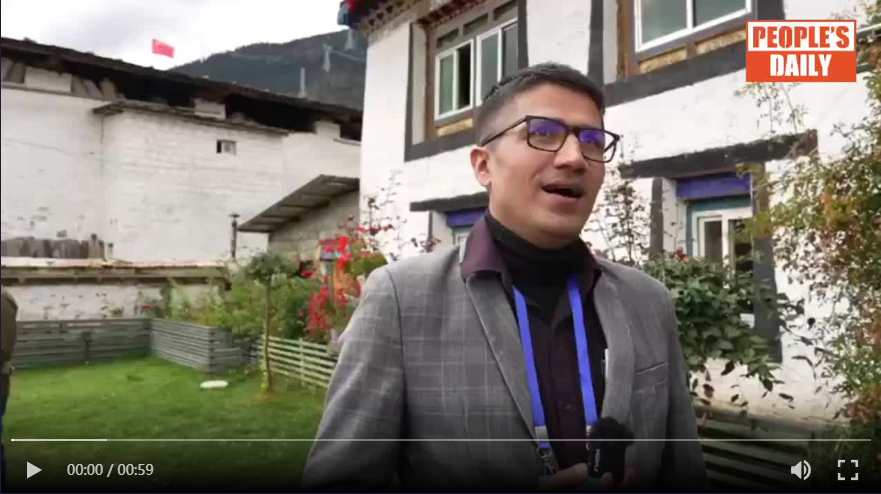| May 22,2020 -- With every corner of the office filled with books, it's obvious the owner is a diligent academician.
The owner is a Tibetan man called Yumba, a graduate of Harvard University and a renowned Tibetan astrological academician. He is the deputy head of the Tibet Medical and Astrology Institute.
Tibetan science of healing, or Sowa Rigpa, relies heavily on the science of astrology.
For hundreds of years, Tibetan ancestors have been producing almanacs through painstaking efforts that involved complex manual calculations, and that would take months to complete.
Yumba has revolutionized the traditional system of producing Tibetan almanac. Thanks to the efforts made by him and his colleagues over the last three decades, Tibetan calendar has entered the era of digitalization today.
Most of the calculations needed to produce the almanac are performed on the computer, improving the speed and efficiency.
In 2016, Yumba's team brought out an almanac in both digital and printed versions covering the last 2,100 years. For the last few years, it is engaged in the task of upgrading the almanac.
Recently, Yumba's institute brought out an almanac covering the last 2,500 years.
"Had the same work been done manually, it would have taken a thousand years to complete," he said.
Tibetan astrology dates back to 100 BC, with different types of calendars emerging in the region throughout history.
From farmers to herders in the remotest areas, or monks to citizens in the urban areas, everyone follows Tibetan almanac in the region.
In fact, it's one of the most widely circulated books in Tibet.
"Almanac is very important for Tibetan people. It tells the time for picking of herbs, cultivation, irrigation and harvesting, besides providing information about festivals, religious rituals, solar terms and eclipses," said Yumba.
According to him, Tibetans refer to the calendar to find out whether a day is auspicious or not, for conducting various social events.
He said the manual production of the annual calendar requires the coordination of several astrology professionals and endless calculations, which can be exhausting.
"When working on almanacs, astrologists are required to memorize a series of complicated formulas. It often requires them to make mental calculations," he said.
Yumba said that while calculating on a traditional sandboard, a wooden stick is used to take notes. The calculations should be memorized as numbers on the sandboard are frequently erased to work on new calculations.
Yumba had proposed the calendar digitalization plan in 1990. With the preliminary work having started in 1991, he has been working on it for nearly three decades to improvise it.
With the use of Visual Basic programming language, it has been achieved.
"A computer is much faster. By typing the year or month, or with the click of a mouse, in less than two to three seconds, the calendar for a particular year or month can be seen on the screen," says Yumba.
Had the same work been done manually, it would have taken several people at least several months to complete, he said.
Not only has Yumba created a software for almanac calculations, but has also developed two cellphone apps for accessing information.
One of the apps, called the Yumba Almanac Calendar, is available in Mandarin, Tibetan and English languages, and provides references to six different Tibetan traditional calendars.
Meanwhile, because of long hours spent on computer, the strain in Yumba's eyes is evident. He uses eye drops to get some temporary relief.
Besides being busy with administrative work, he is almost always devoted to astrology. His colleagues and family members say he is very disciplined and hardworking.
Sometimes, he turns off all the communication devices, and forgets to even have his food, a family member said.
"I need a quiet environment for my work," he says.
"When I am engrossed in work, I don't feel tired at all. I derive great pleasure every time I accomplish a task," says Yumba.
"Tibetan astrology is a very interesting subject, and I hope it can be better preserved and passed on to the future generations."
|
- Home
- News Tibet |Exclusive |China |World |Related News |Latest
- Documents White Papers |Others
- Photo Politics |Economy & Society |Culture & Religion |Human & Nature |Beautiful Tibet |Other Tibetan-Inhabited Area |Exchanges |Related
- Video News |Documentary |Micro-Video |Entertainment
- Art
- Tourism
- In Focus
- About Tibet






